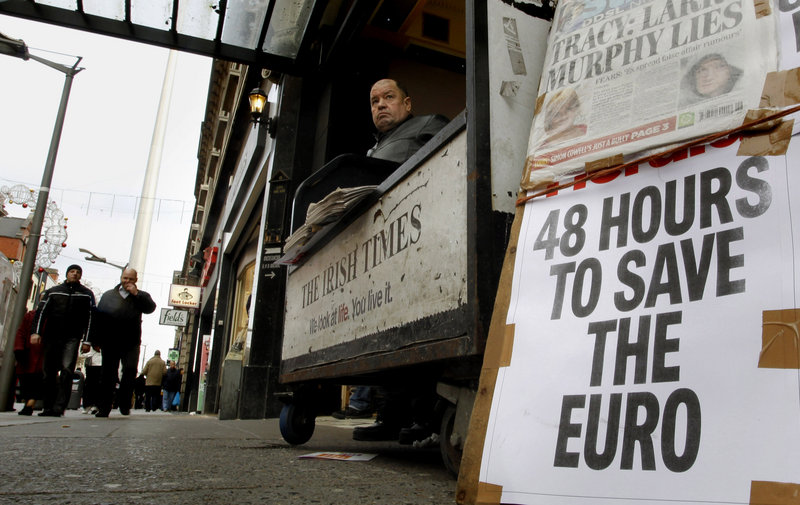BRUSSELS – Europe and the euro will never be the same.
The debt crisis is forcing governments to rewrite some of the eurozone’s most fundamental rules. While some see the current turmoil as the slow-motion wreckage of the common currency bloc, others maintain Europe will have the political resolve to keep it together and even bring it closer together.
Either way, one thing is clear: Thanks to new debt and bailout rules being agreed among the 16 eurozone nations, Europe’s monetary union will be forever altered, even if it survives the crisis.
On Monday and Tuesday, European finance ministers will work on fleshing out a so-called European Stability Mechanism. The new rules will effectively rearrange the eurozone’s power structure to protect stronger economies like Germany from paying for the profligacy of “peripheral” countries like Greece or Portugal, threatening to create a two-tier Europe.
RESISTANCE TO CLOSER UNION
But the prospect of such a growing divide, unexpectedly, raises the question of closer fiscal union — money flowing from rich countries to weaker ones — even though there is huge political resistance to such a scenario.
“The debt crisis is uncovering deeper problems within Europe, calling into question the EU’s future development,” Monument Securities analyst Stephen Lewis wrote in a note this week.
“Without political union of eurozone member states, the hopelessness of the euro’s situation is likely to appear overwhelming. The search is on for the magic bullet that will cure the euro’s malaise,” Lewis said.
At the heart of the stability mechanism — chiefly sought by Germany, Europe’s paymaster — is forcing investors to take part of the losses in debt crises. Bondholders — including banks and hedge funds — were protected in both the bailouts of Greece and Ireland. Now, politicians say that from 2013 they will have to become liable for the risks they agree to take as part of their profession.
HIGHER PREMIUMS SOUGHT
The most direct consequence, however, has been that investors are asking for higher premiums on fiscally weak governments’ debt.
That in turn risks pulling Europe in two different directions — that of economically strong countries who will keep paying low borrowing rates and those who will pay more because of the perceived risk surrounding their debt.
Greece, Ireland, Portugal and even Spain and Italy have to spend more money to refinance their debt, burning up cash that could otherwise have built schools, roads and hospitals and boosted growth and jobs. No longer will they be able to borrow at interest rates close to those paid by fiscally solid Germany — as they did for years after the euro’s launch in 1999.
Germany argues that the higher interest rates will push these countries to be more disciplined in their spending to regain investor confidence.
For the moment, however, they seem to be doing the opposite. Ratings agency Standard & Poor’s warned on Thursday it may downgrade Greece’s long-term debt — adding pressure on already weakened public finances — if the new bailout rules prove too harsh on private bond holders.
ASSUMPTIONS CALLED INTO QUESTION
Whatever finance ministers eventually make of the new stability mechanism, the debt crisis has already called into doubt the assumptions underpinning Europe’s monetary union.
Until last year, the eurozone stuck to two seemingly contradictory mantras: No government could ever default, and no country could be bailed out.
The no-bailout idea fell in May, when Greece received 110 billion euros in rescue loans. The no-default premise was stamped with a 2013 expiration date last Sunday, when European Union finance ministers agreed to force losses on private creditors if a country’s debt pile is deemed too big to bear.
But a growing number of experts believe the region’s problems require much bolder action, in spite of firm opposition from some nations and the European Central Bank.
When they sketched an initial agreement on the new European Stability Mechanism on Sunday — just as they cleared a 65 billion euro bailout for Ireland — EU finance ministers hoped to keep the debt crisis from taking down Portugal, Spain, or even Italy.
Copy the Story Link
Send questions/comments to the editors.



Success. Please wait for the page to reload. If the page does not reload within 5 seconds, please refresh the page.
Enter your email and password to access comments.
Hi, to comment on stories you must . This profile is in addition to your subscription and website login.
Already have a commenting profile? .
Invalid username/password.
Please check your email to confirm and complete your registration.
Only subscribers are eligible to post comments. Please subscribe or login first for digital access. Here’s why.
Use the form below to reset your password. When you've submitted your account email, we will send an email with a reset code.